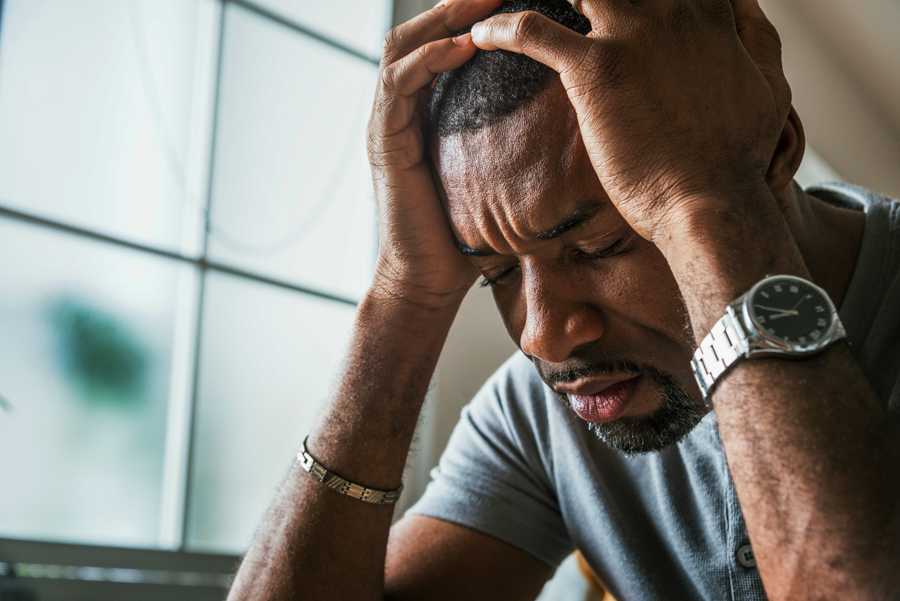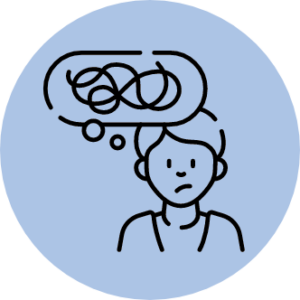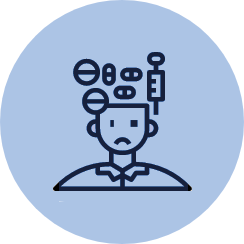Depression Treatment in Maryland
Depression is a common and serious mental health condition characterized by persistent feelings of sadness, hopelessness, and a lack of interest or pleasure in activities. It can impact your day-to-day life, from difficulty sleeping or changes in appetite to problems concentrating or suicidal thoughts. Depression affects a person’s thoughts, feelings, and overall well-being. While everyone may experience occasional sadness or low moods, depression is different in terms of its duration and intensity.
If you or someone you know is struggling with depression, seeking professional mental health treatment in Maryland is crucial. Depression is a very treatable condition and many resources can help you start to feel better.

What Factors Contribute to Depression?
Depression is a complex mental health condition, and its development is typically influenced by a combination of biological, psychological, and environmental factors. It’s important to note that each individual’s experience with depression is unique, and not everyone with these factors will necessarily develop depression.
Family history and brain chemistry both contribute significantly to the development of depression. If depression runs in the family, the risk is increased. Imbalances in brain chemicals, such as serotonin and dopamine, also play a role. These factors show how our genes and brain chemistry can affect the likelihood of experiencing depression.
Negative personality traits, exposure to trauma or stress, and distorted thought patterns contribute to vulnerability and the onset of depressive symptoms. These elements underscore the impact of individual mindsets and life experiences on mental well-being.
Major life events like changes, losses, or financial struggles, along with chronic illness, can act as triggers. Isolation and a lack of social support further increase the risk, underscoring the crucial role of supportive relationships in mental well-being.
Chronic illnesses like pain or cancer and certain medications with depressive side effects can exacerbate or trigger symptoms. This emphasizes the need for a holistic approach to healthcare, recognizing the interplay between physical and mental well-being.
Substance abuse, especially with drugs or alcohol, both contributes to and stems from depression. This cyclical relationship emphasizes the need for comprehensive interventions addressing both issues simultaneously.

Common Symptoms of Depression in Adults and Adolescents
As an adult, watch out for symptoms like:
- Persistent Sadness: Feeling sad, down, or experiencing a pervasive sense of emptiness that persists throughout the day.
- Loss of Interest or Pleasure: Losing interest in activities that were once enjoyable and a general lack of motivation.
- Changes in Sleep Patterns: Insomnia (difficulty sleeping) or hypersomnia (excessive sleeping) are common symptoms of depression.
- Difficulty Concentrating: Trouble focusing, making decisions, or experiencing memory lapses.
- Feelings of Worthlessness or Guilt: Experiencing irrational and intense feelings of worthlessness or guilt, often without a clear cause.
- Suicidal Thoughts: In severe cases, individuals may have thoughts of death or suicide. If someone is experiencing suicidal thoughts, it is critical to seek immediate professional help.

For teens, symptoms may look a little different:
- Irritability or Agitation: Feeling easily irritated or agitated, with a decreased tolerance for frustration.
- Fatigue or Loss of Energy: Feeling constantly tired, even after adequate rest, and struggling with everyday tasks.
- Risk-taking Behaviors: Engaging in risky behaviors such as reckless spending, risky sexual activities, or substance abuse.
- Poor Performance in School: Experiencing a decline in academic performance, reflected in dropping grades or overall poor performance in school.
How is Depression Treated?
Medication Management
Elevated Wellness provides medication options, including antidepressants such as SSRIs, SNRIs, bupropion, and mirtazapine. These medications work by adjusting the levels of chemicals in the brain that influence mood and stress. While it may take some time to find the right medication and dosage, these options are highly effective for many individuals.
Psychotherapy
Psychotherapy is a fundamental component of the treatment approach at Elevated Wellness. Engaging in conversations with a therapist or counselor allows individuals to explore and work through negative thoughts and emotions. This therapeutic process provides coping strategies and helps identify the underlying causes of depression.
Intensive Outpatient Program (IOP)
In cases of moderate to severe depression, Elevated Wellness may recommend an intensive outpatient program (IOP). This program offers more intensive treatment than standard therapy, with both individual and group counseling sessions conducted several times a week. IOPs focus on teaching life skills and building a robust support system. Importantly, individuals can receive intensive treatment while still living at home and managing work or school responsibilities.
With treatment, the symptoms of depression can improve. Continuous management, making lifestyle changes, learning coping strategies, and staying on medication or in therapy as prescribed by your doctor can help you feel better and prevent relapse.



